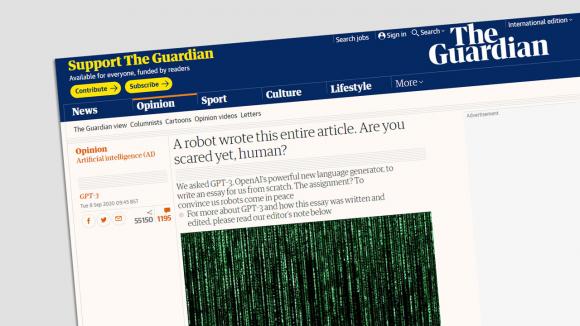GPT-3, this artificial intelligence that writes articles (almost) by itself
Several media, including the British daily The Guardian, have entrusted an artificial intelligence company Open AI with writing editorials. The result is astonishing, but we must beware of any abusive interpretation.
 |
« I am not a human. I am a robot. […] My brain is not a sensitive brain. But he is capable of making rational and logical decisions. […] And now I can write this column. “. This is how the article published by The Guardian, presented as “Written by a robot”. This is a forum that tries to reassure humans by explaining that artificial intelligence is not here to take their place, and that Stephen Hawking is wrong when he says otherwise. “ In fact, I have no interest whatsoever in harming you in any way », Writes this 100% digital author.
We have already seen articles written by software, but, until then, they were fairly basic sports or scholarship reports. This text goes further. First, it is not a review but an editorial, calling on references and abstract notions, spiced up with almost lyrical flights. The text is rather well written and easy to read.
False intelligence
This column was produced by artificial intelligence GPT-3, from the American company Open AI, founded in particular by Elon Musk. It’s about a artificial intelligence language generator, presented as the most powerful of the moment, with 175 billion parameters. GPT-3 is the successor to GPT-2, and it has already been talked about several times since its release this summer. Several texts have been produced, sometimes compared with emphasis to what might be written by great authors.
However, we must put it into perspective. Artificial intelligence didn’t do the job on its own. First, it was programmed (by a student from Berkeley, Liam Port) from specific elements provided by The Guardian. We imposed the subject on him and provided him with a body of data. A bit like giving a writing subject to a college student. Then, this tribune is the synthesis of eight tests generated by GPT-3, which were not all very good, and which were edited by The Guardian. Finally, it is important to specify that GPT-3 has, obviously, no awareness of what it writes, of which it absolutely does not understand the meaning. This is only statistical work on words. This is a false intelligence.
Fake news generator
Nevertheless, one can imagine what this type of tool could give, in a few years. It will undoubtedly be able to produce the best, but also the worst if it is used, for example, to generate fake news. Tomorrow, will writing articles be a menial task, entrusted to artificial intelligences ? The work of an author or journalist would then consist solely of correcting and validating automatically generated texts.
Let’s face it, the author of this column can’t wait to use a artificial intelligence to write his next columns, while he will devote himself to more recreational tasks …



